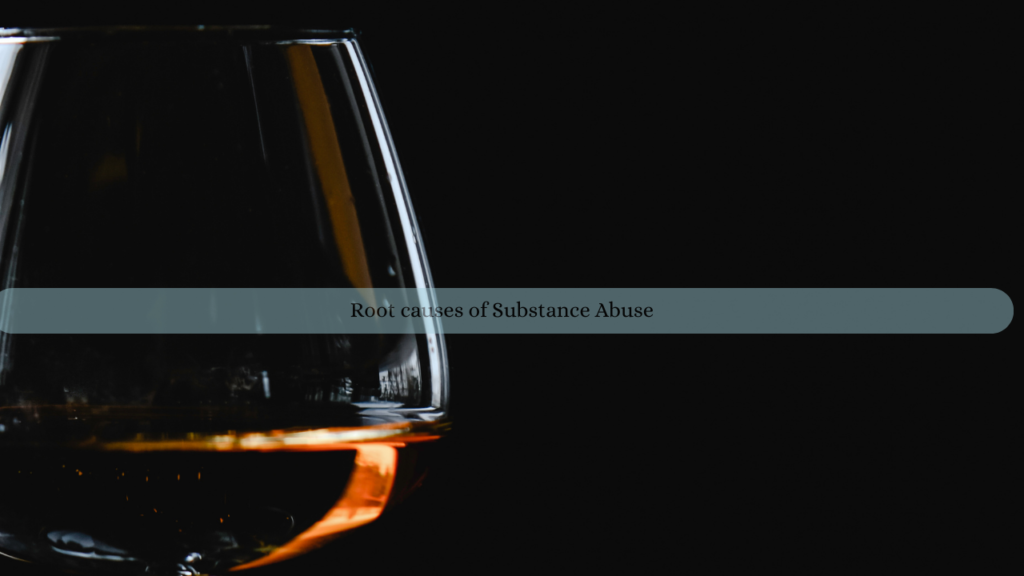
Substance abuse is a complex issue that affects individuals from all walks of life. While the immediate reasons for drug and alcohol use vary from person to person, understanding the root causes of substance abuse can provide insight into why so many people turn to these substances in the first place. Factors such as emotional pain, social influences, mental health disorders, and even biological predispositions all contribute to this widespread issue. In this article, we’ll explore these root causes and how they intertwine to lead individuals down the path of addiction.
1. Emotional Pain and Trauma
One of the most common reasons people turn to substances is to escape emotional pain or trauma. Drugs and alcohol often provide temporary relief from negative feelings, such as sadness, anxiety, or grief. People who have experienced abuse, neglect, or significant loss are especially vulnerable to substance abuse as they may use drugs or alcohol as a coping mechanism to numb their emotional suffering.
For many, substance use becomes a way to avoid confronting deep-seated pain or unresolved issues. The temporary relief can create a cycle in which the individual feels compelled to use more frequently to keep those emotions at bay, eventually leading to addiction.
2. Mental Health Disorders
There is a strong link between mental health disorders and substance abuse. Conditions like depression, anxiety, bipolar disorder, and post-traumatic stress disorder (PTSD) can drive individuals to self-medicate with drugs or alcohol. For some, the use of substances may feel like a way to manage overwhelming symptoms or gain temporary relief from emotional distress.
Unfortunately, while drugs or alcohol may offer a momentary escape, they often exacerbate mental health conditions in the long run, leading to a vicious cycle of worsening mental health and increasing substance use.
3. Social and Environmental Influences
Social pressures and environmental factors play a crucial role in why people begin using substances. Peer pressure, especially during adolescence and young adulthood, can lead individuals to experiment with drugs or alcohol to fit in or gain social acceptance. In some cultures or communities, drug and alcohol use may be normalized or even encouraged, making it easier for individuals to fall into the trap of substance abuse.
Family dynamics also contribute significantly to substance abuse. Children who grow up in households where drug or alcohol use is prevalent are more likely to follow similar patterns. In addition, economic hardships, lack of access to education or opportunities, and living in high-stress environments can increase the likelihood of substance abuse.
4. Genetic and Biological Factors
Some people may be more biologically predisposed to substance abuse due to genetic factors. Studies have shown that certain genetic traits can make individuals more susceptible to addiction. This means that someone with a family history of addiction may be at a higher risk of developing substance use issues themselves.
In addition, the brain’s reward system plays a key role in addiction. Drugs and alcohol stimulate the release of dopamine, the neurotransmitter associated with pleasure and reward. For some individuals, this flood of dopamine can create a powerful reinforcement loop, leading them to continue using substances to experience that same pleasurable feeling over and over again.
5. Curiosity and Experimentation
Finally, curiosity and the desire for new experiences can drive some people to experiment with drugs or alcohol. While this initial experimentation doesn’t always lead to addiction, it can be a gateway for individuals who are vulnerable to the other factors mentioned above. What starts as casual use for fun or out of curiosity can escalate into regular abuse and dependency over time.
Conclusion
The root causes of substance abuse are multifaceted, involving a combination of emotional, psychological, social, and biological factors. People turn to drugs and alcohol for various reasons, often seeking relief from pain, a sense of belonging, or a way to manage mental health conditions. Understanding these underlying causes is critical in addressing addiction and providing effective prevention and treatment strategies. By recognizing the complexities behind substance abuse, we can better support those who struggle with it and work toward solutions that tackle both the symptoms and the root causes.